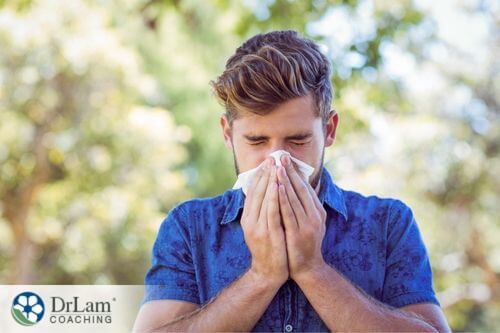Springtime lethargy is a seasonal issue that can have a major effect on your quality of life. This phenomenon impacts more women than men in general. It can take a toll on your body and leave you feeling like you’re running on empty. However, understanding the causes of this springtime issue could help you feel better more quickly and enable you to enjoy the season as well.
Learn more about the causes of this seasonal issue and the steps that you can take to remedy it.
 Springtime lethargy occurs when you experience a state of fatigue, diminished energy, or depression associated with the onset of the spring season. This undesirable and uncomfortable state could result from a normal reaction to warmer temperatures or be linked to medical factors, like allergies.
Springtime lethargy occurs when you experience a state of fatigue, diminished energy, or depression associated with the onset of the spring season. This undesirable and uncomfortable state could result from a normal reaction to warmer temperatures or be linked to medical factors, like allergies.
Springtime lethargy is not categorized as a disease or illness per se, but rather a phenomenon that comes with spring and affects some individuals.
While there could be many different causes of springtime lethargy, the following factors likely play a role for many people.
According to one theory explaining this phenomenon, during the winter, serotonin levels can become depleted. Production of the "happiness hormone" can be boosted by sunlight, but daylight is limited during the winter. Instead, the body produces an excess of melatonin, the "sleep hormone". The effect is a disruption of your normal circadian rhythms, which can leave you feeling groggy and sleepy.
In the springtime, the days are longer and the body begins to adjust its hormone levels. In the process, more endorphins, estrogen, and testosterone are released. As a result, this hormonal shift can put added stress on your body and result in a feeling of tiredness.
The spring season usually has fluctuating temperatures throughout, a constant battle between warm and cold. A shift from warm air to cold air can cause the blood vessels in your body to constrict in an attempt to prevent heat loss. However, this also prevents blood circulation. Consequently, your blood pressure increases. The symptoms of high blood pressure, like dizziness, nausea, and drowsiness, can cause feelings of fatigue.
When the spring season heats up, you could experience a drop in blood pressure. Perspiration could cause you to lose sodium and potassium, and dehydrate, which may lead to a spike in stress hormones and a drop in blood pressure. As a result, this could lead to fatigue. The yo-yo effect of temperature changes could worsen springtime lethargy.
Daylight savings time can also cause fatigue. In spring, clocks are typically shifted forward, which means you will likely experience a disruption in your sleep. You likely will get less sleep the first night the clock is shifted forward by an hour ahead, and you may struggle with getting enough sleep for a few weeks. Your body may need some time to adjust. Loss of sleep can leave you feeling tired, low, and sluggish.
Spring is allergy season and pollen allergies can wreak havoc on your body. They can leave you sneezy, sniffly, and feeling grumpy. Studies suggest that there is a link between allergies and depression, and also, that the springtime pollen period appears to see a jump in the rate of suicides.
Researchers from the University of Maryland at Baltimore found that individuals with a combination of bipolar disorder and active pollen allergies experienced worsening depression during high pollen periods.
Cytokines, the chemical messengers of the immune system, that are triggered by allergy attacks, appear to be the culprit. Also, these chemical messengers promote inflammation and have been associated with what’s referred to as "sickness behavior." Symptoms of "sickness behavior” are similar to depression. These include excessive sleeping, reduced appetite, decreased sex drive, and withdrawal/isolation.
 Allergies cause an overactive inflammatory response and a spike in histamine. It’s common to see allergies surface in Adrenal Fatigue Syndrome (AFS), which is caused by chronic stress that activates the NeuroEndoMetabolic (NEM) stress response.
Allergies cause an overactive inflammatory response and a spike in histamine. It’s common to see allergies surface in Adrenal Fatigue Syndrome (AFS), which is caused by chronic stress that activates the NeuroEndoMetabolic (NEM) stress response.
This inflammation often begins in the gut, where springtime lethargy and allergies could cause the digestive system to slow down. This means it will take longer for the body to break down food and it can also cause stomach irritation. Consequently, inflammation increases in the body. This can increase stress and leave the adrenals unable to produce an adequate amount of cortisol to counteract the inflammation.
Worsening inflammation could amount to worsening AFS, and at the same time, worsen springtime lethargy.
Symptoms of this phenomenon tend to emerge from mid-March to mid-April in North America. These symptoms can vary in severity from person to person. Some common symptoms include:
There are several ways that you can tackle springtime lethargy and make yourself feel better. These include:
To beat springtime lethargy, get outdoors and benefits from a boost in mood, energy, and motivation. By heading into the great outdoors on a nice spring day, you can bask in the sunlight of the early morning. This can boost serotonin, endorphins, vitamin D levels, and have you feeling good.
Also, there are plenty of activities that you can do outdoors, from walking your dog or biking to work. Getting in a good mood early on can help to keep you motivated and full of high-energy all day. Plus, taking in the fresh air can be invigorating as the spring season itself.
However, if you are dealing with serious spring allergies, you may want to opt to sun yourself in a window and avoid some of the pollen. You could also take some supplements like quercetin and bromelain prior to going outside as natural histamine fighters so you can tolerate spring hayfever better.
You cannot go wrong with a balanced diet that features nutritious foods from all the major food groups. To help stimulate the metabolic processes in the body, you must eat right. Opt to fuel your body with foods that are healthy, nutrient-rich, and can boost your mood and energy.
Lean proteins, whole grains, fish (salmon, tuna, mackerel), legumes, green, leafy vegetables, and eggs are good food sources that are packed with essential vitamins and minerals. Foods that contain vitamins, fiber, healthy fats, and minerals that the body needs are ideal to overcome springtime lethargy.
However, avoid heavy meals and stick with light foods, like spring fruits and vegetables, that are easy to digest. Also, don’t forget to drink plenty of water to stay hydrated. Stay away from processed foods and salty foods. You can get a dietitian to help you decide on the right foods to eat if you have any concerns.
It may seem counterproductive to exercise when you are dealing with lethargy, but exercise can be energy-boosting. Spring morning exercise can get the blood flowing, push out the fatigue from your body, and lift your spirits. Get at least 20-30 minutes of exercise doing a physical activity that you enjoy, such as jogging, walking, swimming, hiking, or biking. This can aid in you adjusting to the seasonal change.
In the process of exercising you can work on fitness goals as well. However, before deciding on an exercise routine going, you may need to consult with your healthcare provider if you have other health conditions such as AFS.
 Getting quality sleep can help to keep fatigue at bay and restore your strength to face the next day. Establishing a clear sleep schedule that you maintain is important for managing hormonal changes. You want to avoid interfering with the sleep-wake cycle and keep the body's circadian rhythm balanced.
Getting quality sleep can help to keep fatigue at bay and restore your strength to face the next day. Establishing a clear sleep schedule that you maintain is important for managing hormonal changes. You want to avoid interfering with the sleep-wake cycle and keep the body's circadian rhythm balanced.
In spring you have more sunlight which reduces the body's melatonin (sleep hormone) production. This means that you may have to be more proactive about getting quality sleep.
Life gets busy and sometimes it can be challenging to take a well-needed break. However, if you are dealing with spring lethargy, you may need to slow down and take care of yourself. If winter had you cooped up, get outside and enjoy the warmer weather and the renewing plants. Take a stroll in the park with your kids, partner, friends, or pets.
Meditation and yoga can also help to release the stress and tension from your body. You might also engage in a creative activity. Maybe you could tap into your talents, such as pottery, painting, or drawing. All in all, give your body the time it needs to recuperate from the everyday stresses that it has been dealing with.
Springtime lethargy doesn’t have to weigh you down all season long. If you suspect that you are suffering from this phenomenon, speak to your doctor. Allergies, daylight savings time changes, hormone imbalances, and temperature sensitivities could all be behind this phenomenon. But there are steps you can take to get your energy back.
If you are interested in learning about natural ways to tackle lethargy issues, the team at Dr. Lam Coaching can help. We offer a free** no-obligation phone consultation at +1 (626) 571-1234 where we will privately discuss your symptoms and various options. You can also send us a question through our Ask The Doctor system by clicking here.
Springtime lethargy can be caused by a number of factors. This includes hormonal changes, temperature fluctuations, allergies, and sleep disruptions linked to daylight savings time. You can alleviate symptoms of this phenomenon by getting outdoors and into the sunlight, eating a healthy balanced diet, exercising, getting quality sleep, and taking time to care for yourself.
